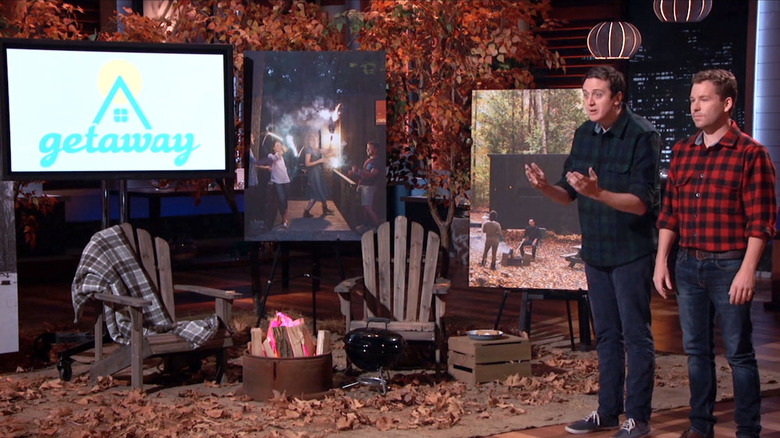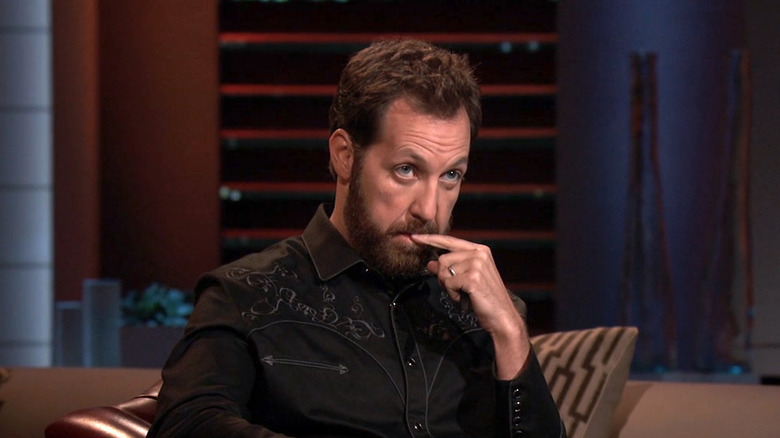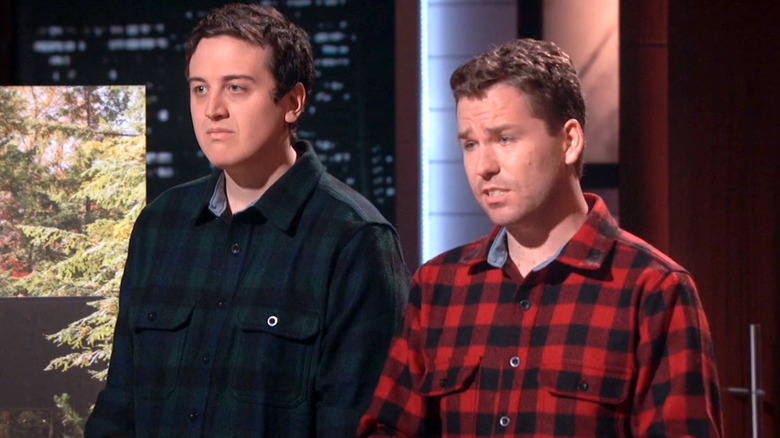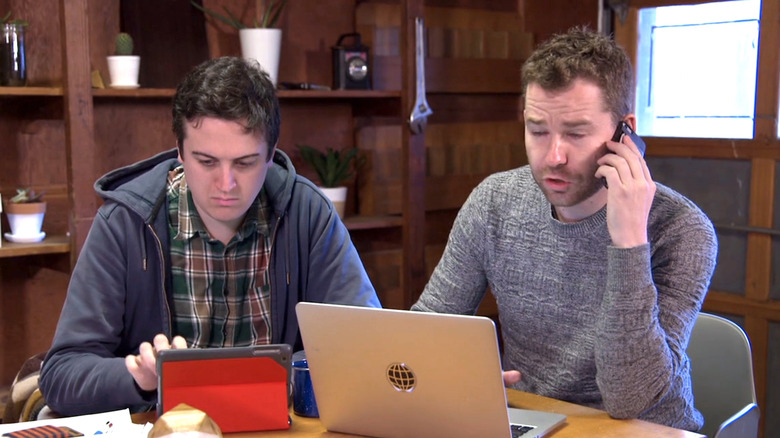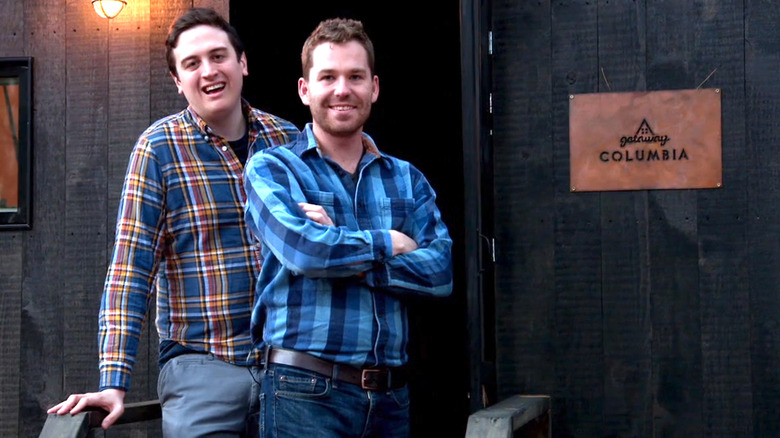What Happened To Getaway From Shark Tank Season 8?
We may receive a commission on purchases made from links.
If ABC's hit reality series "Shark Tank" has taught us nothing else, it's that nobody really knows which ideas and products will succeed in the real world. The show's primary source of intrigue has become watching which ideas the panel of potential investors choose to throw their market weight and hard-earned money behind from week to week.
Watching how the would-be entrepreneurs react when a "Shark Tank" panelist makes an offer is often even more intriguing — especially on the rare occasions when they choose to pass on an investment offer. That was just the case during a Season 8 episode that found Pete Davis and Jon Staff trying to convince the likes of Barbara Corcoran, Chris Sacca, and Season 4 CoatChex investor Mark Cuban to fund their tiny home vacation concept, Getaway. Their model is relatively simple, with the duo seizing on the small-house craze in the context of providing a cheap way to escape the hustle and bustle of daily life by booking a night or two off the proverbial grid without the need to invest in the necessary roughing-it essentials.
Davis and Staff walked into the studio with some impressive financial stats to back their concept, doing so with a substantial ask that equated to a $10 million dollar valuation. While the duo was ultimately able to procure offers from two sharks, they surprised many by essentially passing on both, and it's been fascinating to watch what's happened to Getaway since.
What happened to Getaway on Shark Tank?
The pitch Pete Davis and Jon Staff made for Getaway on "Shark Tank" was fascinating because of the division it inspired in the panelists, which ranged from a few hard "no's" to a pair of tempting offers. There were some potential red flags for the Sharks to consider, of course, as even those who offered a deal were dubious of the company's valuation, with the duo seeking $500,000 for 5% equity in Getaway.
Apart from safety concerns about Getaway's small homes being located in isolated locations, Mark Cuban was genuinely concerned about the cost of upkeep for the tiny houses, believing those set up in harsher climates would degrade far quicker than the company founders claimed. While the Getaway founders weren't able to put all those fears to bed, they still put a good enough foot forward to tempt a pair of Sharks.
Kevin O'Leary was the first investor to bite, offering the requested $500,000 as a loan at 11% interest in exchange for 2.5% equity. Team Getaway wasn't crazy about taking on the debt, however, and opted to hear other offers. In the process, O'Leary got impatient, pulling his offer as Davis and Staff hashed things out with Chris Sacca. Though he had hesitations, Sacca still saw the potential and tried to tempt Team Getaway with a $500,000 investment at 7.14% equity. That offer was well below the $10 million valuation, however, and the structure of the deal ultimately gave Sacca a better position than Getaway's original backers. Noting those factors, Davis and Staff passed on the deal.
What happened to Getaway after Shark Tank?
Though they were clearly bummed at not being able to strike a deal, Pete Davis and Jon Staff were still confident that Getaway was in a better-than-solid position for future growth. As they exited the "Shark Tank" studio, they even hilariously noted that they'd happily offer a free Getaway stay to the panelists who might be stressed about missing the boat when the company hit it big. Turns out, the pair were right to bet on their business, as Getaway saw some impressive growth in the wake of its primetime debut.
The day after Getaway's "Shark Tank" appearance, the company's website saw upward of 100,000 visitors, a dramatic increase over the 1,000 to 3,300 it had been seeing on a daily basis. There was a subsequent spike in reservations, too, with Getaway reportedly selling out all of its tiny homes — then only about 10 to 12 units — through the ensuing Summer season. Riding the "Shark Tank" wave, Davis and Staff sought to get cracking on their expansion plans, doing so with the help of a $15 million strategic growth investment from the private equity firm L Catterton.
By 2022, Getaway was managing as many as 784 properties in 19 locations throughout the United States, including tiny home sites set up outside of major cities like New York, Los Angeles, Atlanta, Boston, Washington D.C., Austin, and Portland, among others. While that number is a little short of the sort of expansion Team Getaway was eyeing during its "Shark Tank" pitch, it's still impressive considering where they were just a few years ago.
Is Getaway still in business?
Getaway is still functioning today, and no doubt benefitted from a pandemic boom that found their isolated rental properties very much in demand. The company has only continued to grow in the last couple of years, too, with its portfolio ballooning to about 1,200 tiny homes. The further expansions were aided by additional rounds of funding, with Getaway reportedly securing a $22.1 million contribution from Starwood Capital in 2019 and a massive $41.7 million from Certares in 2021.
With 29 tiny home locations in play in 2024, Getaway had seemingly grown not only beyond its founders' dreams but beyond its own name, with the company rebranding to Postcard Cabins in October of that year. With a new name headlining the company's website and letterhead, Postcard Cabins is set to expand its operations even more in the future, having recently been acquired by none other than hospitality conglomerate Marriott International.
That deal came to fruition in December of 2024. With the backing of a hospitality powerhouse like Marriott International, it looks like Postcard Cabins may soon be positioning itself to join the ranks of some of the major online sites for booking travel plans.
What are the Getaway founders up to today?
With Postcard Cabins primed to hit the big time with backing from Marriott International, one has to wonder whether or not the "Shark Tank" panelists aren't actually kicking themselves for not throwing in with Pete Davis and Jon Staff when they had the chance to get in on the relative cheap. Turns out that those investors likely would not have been in business with Pete Davis for very long, however, as it appears the Getaway co-founder cashed out his own stake in the operation some time ago.
Per Davis' LinkedIn page, he left the company in 2018 and has largely worked in the political arena since then, serving as an occasional writer and co-directing the 2023 documentary "Join or Die" alongside Rebecca Davis. Davis also calls the shots for the Democracy Policy Network, which he co-founded in 2017.
Jon Staff is still at the company, with his Linkedin page noting he remains the CEO and holds a seat on the Postcard Cabins board of directors. Alongside those duties, Staff has recently worked with private equity innovators The Newcastle Network and served as an Advisory Board Member for The Ali Forney Center, which offers support to at-risk LGBTQ+ youths. Since 2022, the Harvard grad has also held the title of Entrepreneur in Residence for the Harvard Business School.
"Shark Tank" is currently available to rent or buy on Prime Video.
